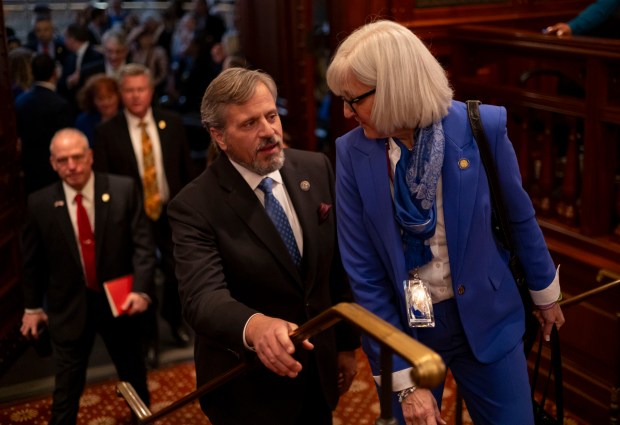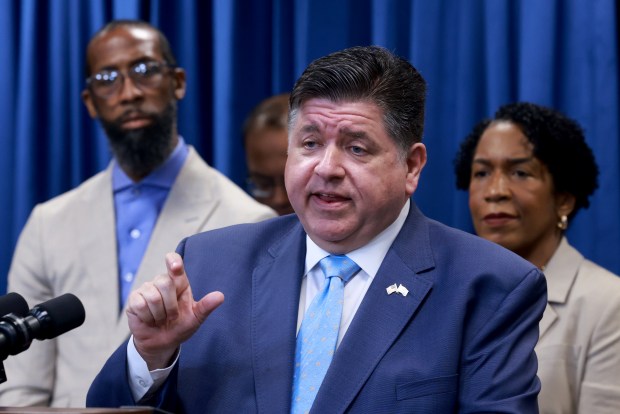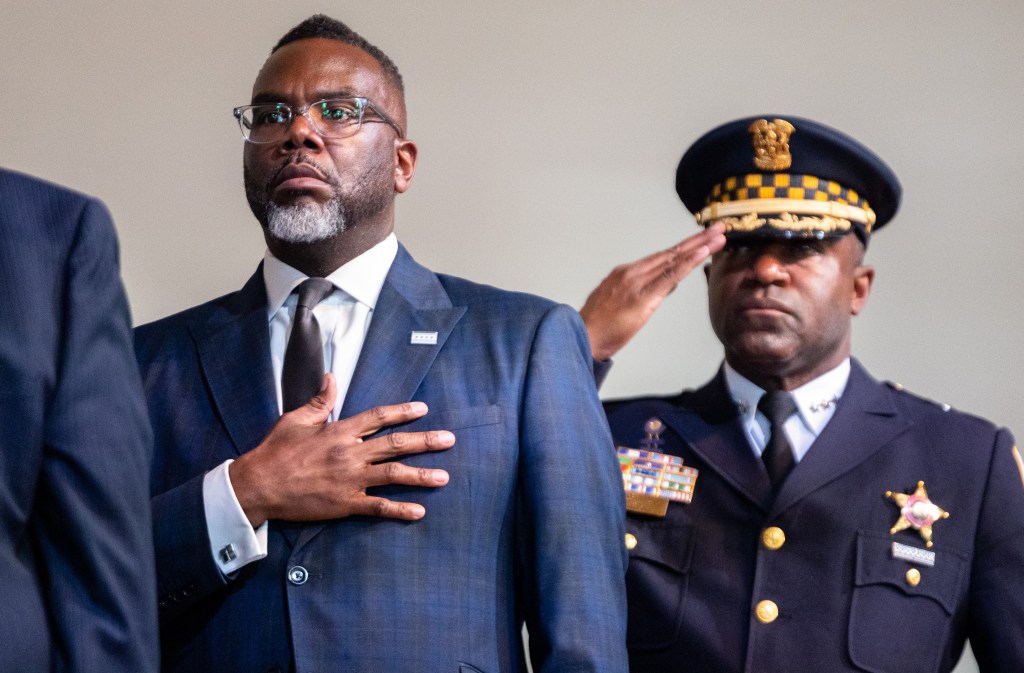Mayor Brandon Johnson on Tuesday acknowledged a controversial pension sweetener for Chicago cops and firefighters signed into law late last week by Gov. JB Pritzker will significantly set back Chicago’s fiscal health but maintained both his and the governor’s hands were tied.
“My team worked extensively with the governor and the General Assembly around this particular piece of legislation, and we made it very clear that this legislation would certainly make our situation far more difficult because of the fact that there wasn’t any revenue attached,” Johnson said at a City Hall news conference. But he said the outcome of the pension changes was a done deal because “this bill was already baked and ready to be served in 2023.”
“Look, I get the position that the governor was in. It’s a veto-proof majority. He was in a tough position,” Johnson added of the support the bill received in the General Assembly. “I understand that, and I’m going to continue to work with the governor around ways in which we can generate the revenue to respond to pensions, transportation, education.”
Johnson’s comments came after Pritzker on Friday signed the measure into law, even though it is expected to eventually cost the city’s taxpayers billions of dollars. The legislation provides some Chicago police officers and firefighters with higher pensions by bringing parity between Chicago and downstate first responders and helping bridge a shortfall in benefits for employees hired after 2010. In making their case for the legislation, Chicago police officers and firefighters argued they deserved the same benefits as downstate first responders.
The bill cleared the House and Senate in the final days of the spring legislative session without opposition. And last week, a spokesman for the governor said his signing of the bill represented “a proactive step to prevent more significant financial or legal issues in the future” by helping ensure that more recently hired cops and firefighters would receive benefits equal to what Social Security provides.
The legislation’s lead sponsor, state Sen. Robert Martwick, a Democrat from Chicago, said he was making good on a promise made in 2019 to bring Chicago police and firefighters hired after 2010 — known as Tier II pensioners — up to par with their downstate counterparts.
But the bill was also criticized for forcing the city to pay a massive bill down the road and was an unfunded mandate because it didn’t provide a revenue stream to help pay for the added pension costs.
Asked what he did to stop the bill, the mayor said his team advocated for attaching a new revenue provision to it but Johnson did not elaborate. He said ultimately, “it just didn’t quite matter” to lawmakers when “those votes were there when I was sworn in two years ago.”
The mayor’s latest characterization of his team’s behind-the-scenes efforts to influence the consequential bill reflected the freshman mayor’s often-shaky Springfield strategy thus far — one that some lawmakers have said is ineffective. Johnson has focused on sounding the alarm for so-called “progressive revenue” despite his tense relationship with the governor, a potential 2028 presidential contender who does not appear to have much appetite for sweeping new taxes at this point.
 State Sens. Robert Martwick and Mary Edly-Allen before Gov. JB Pritzker delivered his annual State of the State address Feb. 19, 2025, at the Illinois State Capitol in Springfield. Martwick was the main bill sponsor of a pension sweetener for Chicago police and firefighters that Pritzker signed into law last week. (Brian Cassella/Chicago Tribune)
State Sens. Robert Martwick and Mary Edly-Allen before Gov. JB Pritzker delivered his annual State of the State address Feb. 19, 2025, at the Illinois State Capitol in Springfield. Martwick was the main bill sponsor of a pension sweetener for Chicago police and firefighters that Pritzker signed into law last week. (Brian Cassella/Chicago Tribune)
The mayor on Tuesday did not elaborate on what sorts of new taxes he’d embrace, but he did not shoot down the possibility of asking the state to expand Chicago’s home rule authority to implement new levies.
Johnson convened a working group in the spring of 2023 with a broad mandate to find solutions to the city’s underfunded pensions. A year later, city leaders announced it would instead focus on Tier II solutions, with a report coming within weeks. Asked Tuesday what the status of the group’s work was, Johnson said supporters of the pension sweetener bill who were members of the working group won out.
“That didn’t happen,” Johnson said of the group’s proposed work to propose funding solutions. “It’s a disappointment.”
Dave Sullivan, a lobbyist for the Fraternal Order of Police Lodge 7, said in the union’s June newsletter that Pritzker called several years ago “personally to assure me that he would make Tier 2 parity … a reality.”
But fiscal watchdogs have raised questions about how much of a burden the law will have on the city. Joe Ferguson, president of the Civic Federation, said the bill “adds to the city’s burdens at the worst possible moment, with no consideration of the city’s actual capacity to meet those burdens.”
The ratings agency S&P said in a Monday bulletin that following the governor’s signature, “the prognosis for Chicago’s long-term fiscal health has weakened, underscoring the need for decisive action during the coming budget cycle to place the city’s finances on a sustainable path.”
Pritzker spokesman Alex Gough said the governor “expects the city of Chicago to implement these changes with careful planning and fiscal discipline.”
 Flanked by several elected officials, Gov. JB Pritzker speaks to the media on July 28, 2025, after signing two bills advancing his agenda of commonsense gun laws and improving safety in Illinois communities. (Antonio Perez/Chicago Tribune)
Flanked by several elected officials, Gov. JB Pritzker speaks to the media on July 28, 2025, after signing two bills advancing his agenda of commonsense gun laws and improving safety in Illinois communities. (Antonio Perez/Chicago Tribune)
The change adds $60 million to the city’s pension tab for 2027 and roughly $750 million more by 2055, according to the city’s chief financial officer, Jill Jaworski. Billions will be added to the funds’ long-term liabilities, the Civic Federation has said. The legislation is also expected to drop the “funded ratios” — the dollars needed to pay out future retirees — of the police and fire pension funds down to 18% from 25%. That hit would come after several years of the city shelling out millions more in pension contributions to prevent the funds from cannibalizing their own assets.
The city is expected to make a $1.11 billion contribution to the police pension and $450 million to the fire pension in 2026.
Jaworski previously said the change was an unfunded mandate that still left considerable unfinished business on the horizon, including a “safe harbor” solution for the city’s two other pension funds to ensure benefits kept up with Social Security. Legislators failed to pass any legislation addressing future shortfalls for future pensioners.
This fix includes “much more generous benefit expansions” than other Tier II reform proposals, S&P said in its bulletin warning that the city’s pension woes could worsen still, as two of Chicago’s other retirement funds will also likely require Springfield action to reach safe harbor compliance, thus adding “additional uncertainty” around the city’s liabilities.
Johnson stopped short of publicly calling for the governor to veto the bill last month, only expressing concern “about the expectation and the demand of taxpayers to be able to pay these pensions,” again making the case that the state should allow the city to raise more progressive revenues.
Originally Published: August 5, 2025 at 12:29 PM CDT
